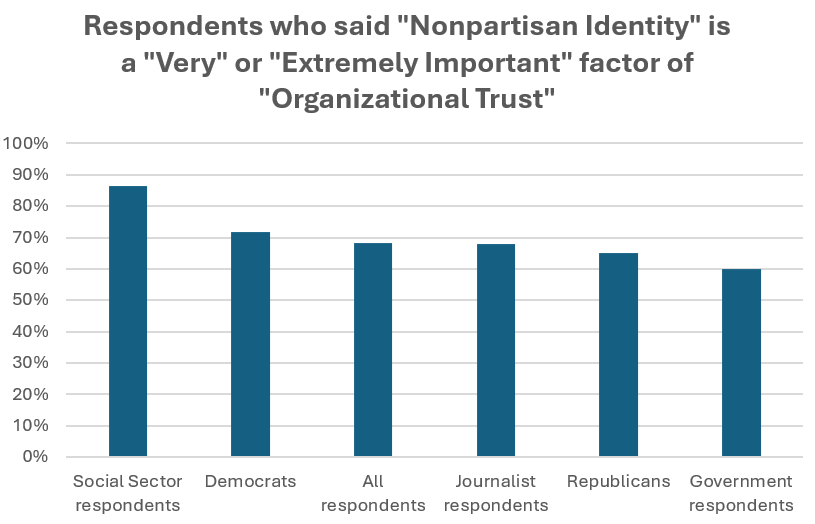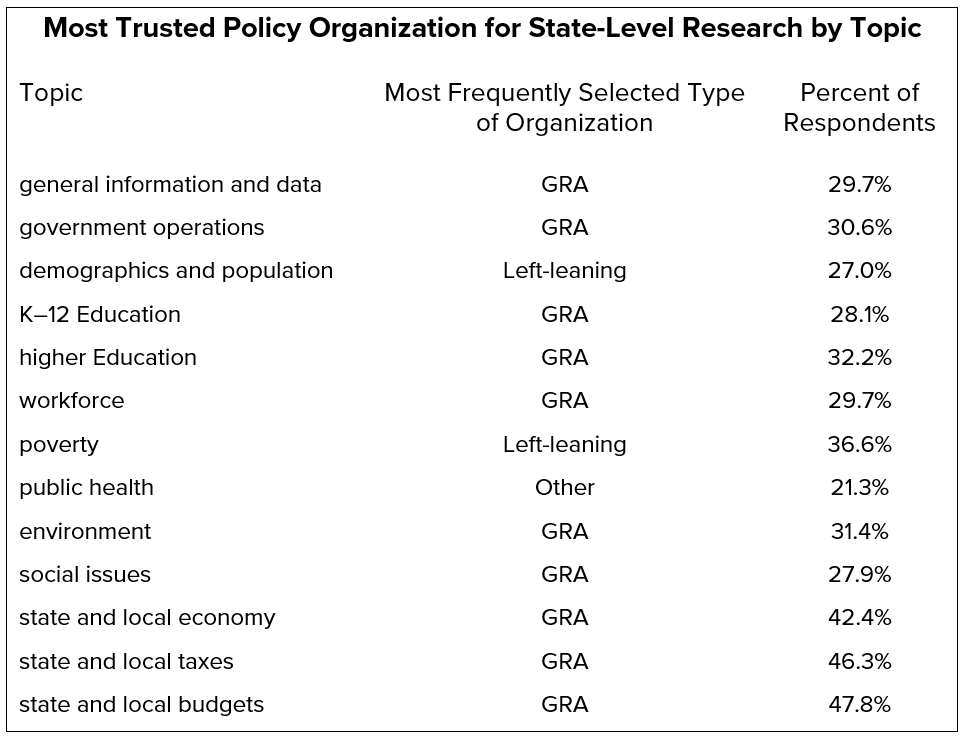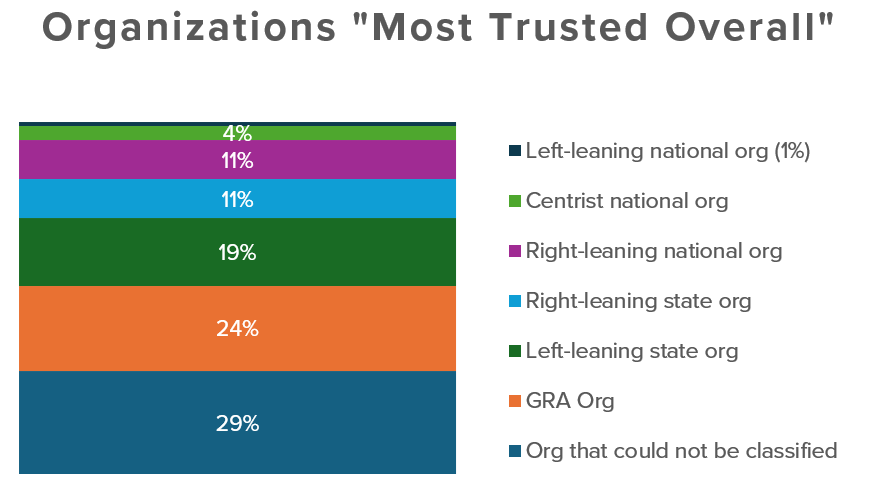At its founding in 1914, the GRA “was the only game in town” for those interested or engaged in public administration.[i] The GRA claimed 100 members by 1927[ii] and 400 by 1938.[iii] However, as early as the 1920s, public administration and public policy work were evolving into professions and academic fields, often with little overlap. These and other developments led to a fracturing of the GRA in 1939, reducing its size and influence. Think tanks proliferated, first at the national and international level and, by the 1990s, at the state and local level. By the late nineties, more than a hundred state-level think tanks were in existence,[iv] with 65% founded after 1980.[v] For comparison, only four current GRA member organizations were founded after 1980. By the early twenty-first century, ideological think tanks outnumbered non-ideological think tanks, and conservative institutions outnumbered liberal institutions.[vi]
In an information-saturated environment where much policy research is a private good for paying customers rather than a public good in the general interest, and elected officials, civil servants, and voters can find the ‘research’ that affirms their presuppositions, who listens to GRA organizations? More precisely, what is the role and reputation of government research organizations in state policymaking? These were the guiding questions of my dissertation research.
Fundamentally, the research is about effectiveness—notoriously difficult to assess for organizations not actively supporting or opposing specific policy choices. Rather than attempting to measure the effectiveness of GRA organizations, I explored organizational reputation, which is defined as the perceived quality of organizations’ products and the prominence of organizations in the minds of key stakeholders.[vii] Organizations held in high regard are, all else equal, better positioned to influence the policy process. Conversely, organizations with a limited or negative reputation will not likely affect the policy process. Thus, while a given organization’s influence may be difficult to quantify, organizations with better reputations are better positioned to exert influence when opportunities arise.
I surveyed policy professionals in the 16 states that have at least one member of the GRA, the right-leaning State Policy Network (SPN), and the left-leaning Economic Analysis Research Network (EARN), or the left-leaning State Priorities Partnership (SPP).
Respondents were asked about their sources of policy research for their state, top-of-mind organizations, most trusted organizations in different policy areas, and most trusted organizations overall.
SUMMARY OF KEY FINDINGS
When Asked About Sources of Information for Their State:
- 86% cited policy or research organizations as one source they consult.
- 5% were familiar with the GRA.
- 7% who were familiar with SPN.
- 5% were familiar with EARN or SPP.
When Asked About Top-of-Mind Organizations:
- 53% listed a policy research organization, and of those:
- 36% listed a GRA organization.
- 39% listed a left-leaning organization.
- 26% listed a right-leaning organization.
- 22% of all respondents identified a GRA organization.


Most Trusted Policy Organization for State-Level Research by Topic:
- A plurality of all respondents reported the most trust in a GRA organization in 10 of 13 categories.
- Democrats reported most trust in a GRA organization in 8 categories and a GRA or left-leaning organization in 2.
- Republicans reported most trust in a GRA organization in 4 categories and a GRA or centrist national organization in 1.
- Conservative state-level organizations were reported as most by Republicans in 1 of 13 categories.

These findings suggest that while GRA organizations may not always be top of mind or seen as most trusted in the abstract when thinking about specific issues, we compare very well. State-level ideological organizations are far less trusted. Nonpartisan identity is very important, as are personal relationships and standing among policy actors’ peers.
Finally, a few themes in the academic literature are worth highlighting. State (and local) policymakers are:
- Presumed to be “more open to policy analysis from independent sources.”[viii]
- More inclined to rely upon information produced locally, specifically research with actionable recommendations.[ix]
- Likely to prefer simple rather than complex and are skeptical of studies they can neither understand nor evaluate.[x]
This post was written by Ryan Hankins from PARCA.
[i] Lee, Mordecai. 2014. “Colluding to Create the American Society for Public Administration and the Consequent Collateral Damage.” Public Voices 14 (1): 2–27. https://doi.org/10.22140/pv.41.
[ii] Forbes, Russell. 1931. “Report on the Work of the Governmental Research Association from November 1, 1930 to October 31, 1931.” In Proceedings, Twentieth Annual Meeting of the Governmental Research Association, 24–27. Washington, DC: GRA.
[iii] Hazelrigg, Hal. 1938. “The ‘1313’ Group in Chicago.” The Annals of the American Academy of Political and Social Science, 99:183–89.
[iv] Rich, Andrew, and Kenneth Weaver. 1998. “Advocates and Analysts: Think Tanks and the Politicization of Expertise in Washington.” In Interest Group Politics, edited by Allan Cigler and Burdett Loomis, 5th ed., 235–53. Washington, DC: Congressional Quarterly.
[v] Rich, Andrew. 2004. Think Tanks, Public Policy, and the Politics of Expertise. Cambridge, England: Cambridge University Press.
[vi] Ibid.
[vii] Rindova, Violina P., Ian O. Williamson, Antoaneta P. Petkova, and Joy Marie Sever. 2005. “Being Good or Being Known: An Empirical Examination of the Dimensions, Antecedents, and Consequences of Organizational Reputation.” Academy of Management Journal 48 (6): 1033–49. https://doi.org/10.5465/amj.2005.19573108.
[vii] Stone, Diane. 1996. Capturing the Political Imagination: Think Tanks and the Policy Process. London: Frank Cass.
[ix] Feldman, Penny Hollander, Pamela Nadash, and Michal Gursen. 2001. “Improving Communication Between Researchers and Policy Makers in Long-Term CareOr, Researchers Are From Mars; Policy Makers Are From Venus.” The Gerontologist 41 (3): 312–21. https://doi.org/10.1093/geront/41.3.312; VanLandingham, Gary. 2018. “Policy Analysis in the States.” In Policy Analysis in the United States, edited by John A. Hird, 12:113–30. International Library of Policy Analysis. Bristol, England: Policy Press.
White, Darcy, and Gary VanLandingham. 2015. “Benefit-Cost Analysis in the States: Status, Impact, and Challenges.” Journal of Benefit-Cost Analysis 6 (2): 369–99. https://doi.org/10.1017/bca.2015.39.
[x] Nelson, Robert H. 1987. “The Economics Profession and the Making of Public Policy.” Journal of Economic Literature 25 (1): 49–91.